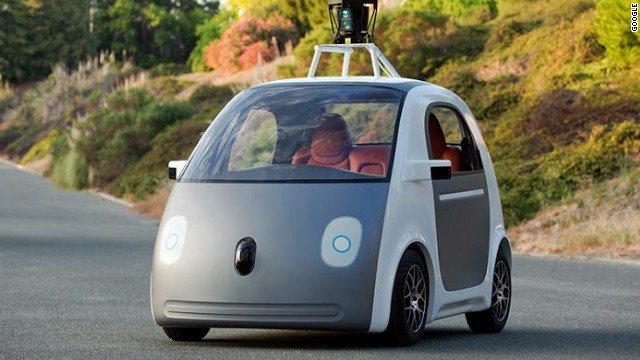Google's New Self-Driving Car Has No Steering Wheel or Brake

Google has been demonstrating its driverless technology for several years by retrofitting Toyotas, Lexuses and other cars with cameras and sensors. But now, for the first time, the company has unveiled a prototype of its own: a cute little car that looks like a cross between a VW Beetle and a golf cart.
"They won't have a steering wheel, accelerator pedal, or brake pedal ... because they don't need them," Google said Tuesday in a blog post introducing the unnamed electric vehicles. "Our software and sensors do all the work."
Unlike previous models, these cars won't have human drivers monitoring them at all times. Google said the cars can detect objects up to 200 yards away in all directions and adjust their speed, turns and braking accordingly.
The cars' speed for now has been capped at 25 mph, allowing engineers to minimize the risk of crashes during testing.
Inside, the spartan cars have few dashboard controls, no glove box and no stereo.
"We've designed for learning, not luxury, so we're light on creature comforts," Google said. "But we'll have two seats (with seatbelts), a space for passengers' belongings, buttons to start and stop, and a screen that shows the route -- and that's about it."
Google did not explain how the car navigates, although passengers would presumably punch in a destination on the dashboard screen and let the computers do the rest.
The company plans to build about 100 prototype vehicles and begin testing them later this summer. If everything goes well, Google then will run a small pilot program in California over the next few years.
The cars represent another step into hardware for Google, which in recent years has introduced its Glass connected headset and bought Nest, a startup that makes "smart" thermostats and smoke detectors. Google said it eventually hopes to partner with an automaker to produce the self-driving vehicles instead of building them itself.
The bubblelike Google cars arrive as the U.S. is struggling to accept a sci-fi future of robotic vehicles and other technological advancements. A recent Pew survey found that half of Americans would not ride in a self-driving car.
Four states -- California, Nevada, Florida and Michigan -- now allow self-driving vehicles on their roads as long as a human driver is behind the wheel at all times.
Most major automakers are also developing vehicles that drive autonomously.
Google posted a video Tuesday featuring testimonials from people who had ridden in the new cars.
"The human feeling of it is very well engineered, and it is very smooth," said an older man identified only as Nick. "There's nothing that makes you feel the least bit threatened."
Related News


